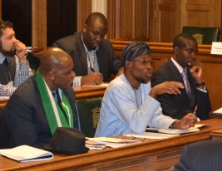The role of school feeding in supporting agricultural development and educational achievement is to be the central topic of an address by H.E. Ogbeni Raul Argebesola, Govenor of Osun State, Nigeria, leading experts and British parliamentarians at a special event in the UK’s House of Commons on Wednesday 22nd January.
 The Governor has been invited by the
All Party Parliamentary Group (APPG) on Agriculture and Food for Development and the
Partnership for Child Development (PCD) Imperial College London, to speak at a meeting attended by development experts focusing on the evolution and improvement of government-led Home Grown School Feeding (HGSF) programmes in low and middle income countries which feed school children using food grown locally by smallholder farmers.
The Governor has been invited by the
All Party Parliamentary Group (APPG) on Agriculture and Food for Development and the
Partnership for Child Development (PCD) Imperial College London, to speak at a meeting attended by development experts focusing on the evolution and improvement of government-led Home Grown School Feeding (HGSF) programmes in low and middle income countries which feed school children using food grown locally by smallholder farmers.
These programmes have the potential to bring countries closer to the UN Millennium Development Goals of halving poverty and hunger, and ensuring universal primary education by 2015. Appropriately designed school feeding programmes have been shown to increase access to education and learning, and improve children’s health and nutrition, especially when integrated into comprehensive school health and nutrition programmes. At the same time, programmes which source their produce locally provide a regular and reliable income for smallholder farmers.
Osun State is itself is at the vanguard of the HGSF movement with its O’Meals school feeding programme feeding over 240,000 children from over 1328 government run schools. The O’Meals programme has proved to be a ‘win-win’ for children and farmers alike; with primary school enrolment increasing by 24% since the inception of providing free school meals, whilst at the same time securing farmer livelihoods and access to markets. The O’Meals programme also encompasses wider school health and nutrition initiatives including hygiene promotion and deworming children for common worm infections which have negative impacts on their development and learning abilities.
Speaking about the success of the school feeding programme Governor Aregbesola said, "That well fed and healthy pupils are learning under an encouraging environment in order to secure a great future for themselves and the country, stands as one of the greatest achievements of our administration.”
Lord Cameron of Dillington who will be chairing the event said, “'I invite all those working for equitable agricultural development as well as for universal quality education to learn about a successful programme in Nigeria that is helping to ensure progress on both fronts.”
The meeting will also see speeches by: Lead Health and Education Specialist at The World Bank, Professor Donald Bundy; Chief of School Feeding and Chronic Hunger at the World Food Programme Food, Mr. Peter Rodrigues; Senior Food & Nutrition Security Advisor at The New Economic Partnership for African Development (NEPAD), Ms. Boitshepo Bibi Giyose and Senior HGSF Technical Advisor at PCD, Imperial College London Professor Josephine Kiamba.
PCD, which launched its six year HGSF initiative in 2009, supports government action to deliver high quality, cost effective school feeding programmes sourced from local farmers in sub-Saharan Africa.
The APPG on Agriculture and Food for Development regularly holds meetings in the UK Parliament to explore and stimulate discussions on contemporary issues. Next week’s dialogue offers the opportunity for parliamentarians, civil servants, academics and other representatives of civil society to hear and discuss ways in which HGSF is working to reduce poverty, improve education and ensure food security within and across sub-Saharan Africa and beyond.
>>Ends
For further media information please contact Francis Peel at the Partnership for Child Development, Imperial College London on 020 7594 3292 or email
f.peel@imperial.ac.uk
Notes to Editors
The Parliamentary meeting ‘The Evolution of Home Grown School Feeding’ will take place on Wednesday 22nd January 2014 from 2 – 3.30pm in Committee Room 16 of the House of Commons.

